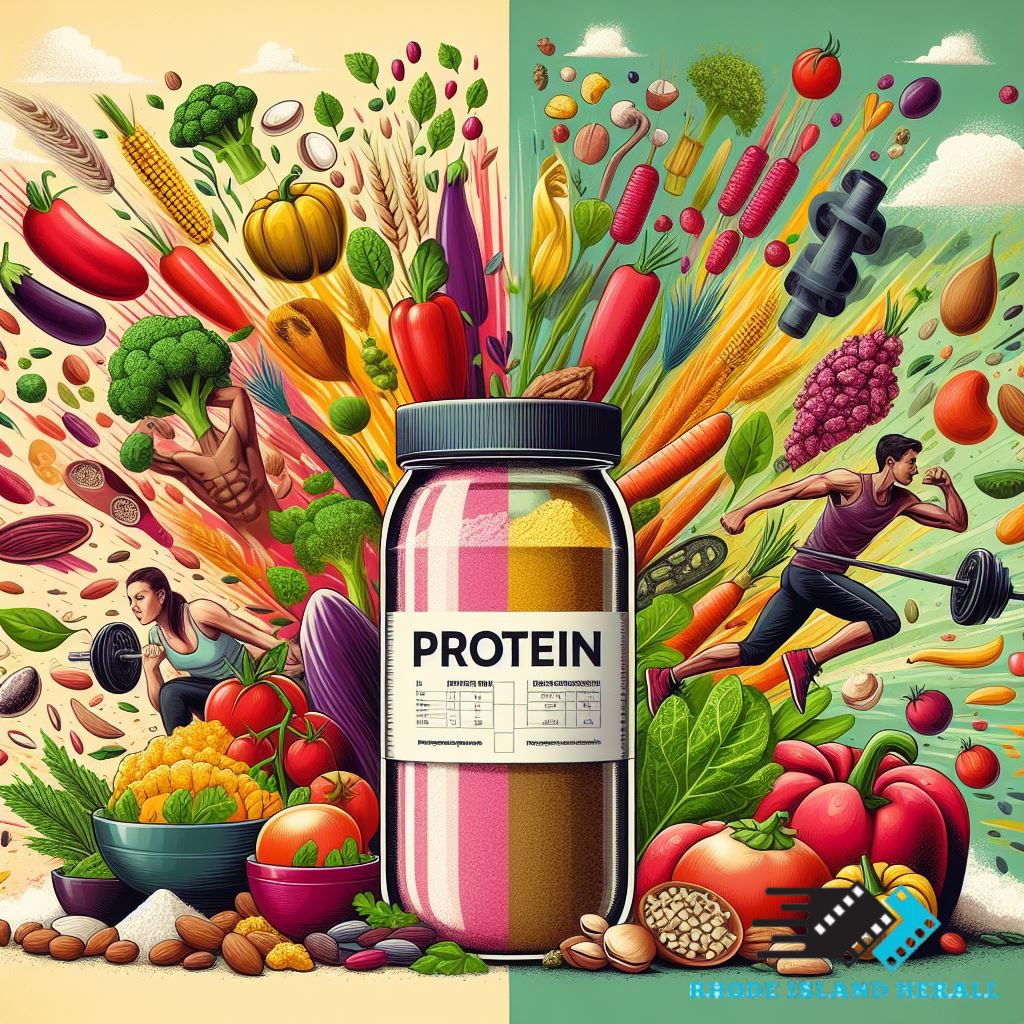When it comes to building a healthy diet, protein plays a crucial role in maintaining our body’s functions and overall well-being. For vegetarians, ensuring an adequate intake of protein can sometimes be a concern. However, with the abundance of plant-based protein sources available, there’s no need to worry. In this guide, we’ll explore the diverse world of vegetarian protein powerhouses and how you can incorporate them into your meals for a vibrant and nourishing diet.
For those embarking on a vegetarian journey, the question of protein sufficiency often arises. But fear not, the plant kingdom brims with an abundance of protein-rich options, waiting to be explored. This definitive guide delves into the vibrant world of vegetarian protein sources, empowering you to craft a nourishing and delicious vegetarian diet.
The Building Blocks of Life
Proteins are often referred to as the building blocks of life, and for good reason. They are essential for the growth and repair of tissues, as well as the production of enzymes and hormones in our bodies. While animal products are commonly associated with protein, there are plenty of plant-based options that can provide all the essential amino acids our bodies need.
Protein on a Vegetarian Diet: Dispelling Myths
One common misconception about vegetarian diets is that they lack sufficient protein. However, by incorporating a variety of plant-based foods into your meals, you can easily meet your protein needs. Not only are these foods rich in protein, but they also offer a host of other nutrients, such as fiber, vitamins, and minerals, making them an excellent choice for overall health and well-being.
Vegetarian Protein Powerhouses: Legume Love
Legumes, such as beans, lentils, and chickpeas, are a staple in many vegetarian diets and for good reason. Not only are they packed with protein, but they’re also versatile, affordable, and delicious.
Beans: The Humble Giants of Protein
Kidney beans, black beans, and lentils are all excellent sources of protein, offering a hearty and satisfying addition to any meal. Kidney beans, in particular, are a powerhouse of potassium and protein, while black beans provide a versatile source of fiber and protein. Lentils, on the other hand, are a speedy sprout for protein and iron, making them a perfect choice for quick and nutritious meals.
A culinary chameleon, beans come in a dazzling array of varieties, each boasting a distinct flavor profile and nutritional composition. Black beans, kidney beans, and pinto beans are all protein stars, delivering around 15 grams per cooked cup.
Chickpeas: The All-Star Legume for Protein and Fun
Chickpeas are another legume worth celebrating, not only for their protein content but also for their versatility in the kitchen. Whether mashed into hummus or tossed into salads and stews, chickpeas are a delicious and nutritious addition to any meal.
Lentils: These tiny nutritional titans pack a powerful protein punch, offering roughly 18 grams per cooked cup. Lentils cook quickly, making them ideal for weeknight meals, and their earthy flavor pairs beautifully with a multitude of spices and cuisines.
Peas: Don’t underestimate the humble pea! Green peas, snow peas, and snap peas are surprisingly protein-rich, offering 8-9 grams per cup when cooked.
Soy Milk and Yogurt: Dairy-free alternatives, soy milk and yogurt provide a source of protein alongside calcium and vitamin D for strong bones. Opt for unsweetened varieties and flavor them with fresh fruits, nuts, or spices for a satisfying snack or breakfast.
Soy Fantastic: Exploring Soy-Based Protein Options
Soybeans are a unique source of plant-based protein, offering a wide range of options for vegetarians.
Soy products, derived from the soybean, have become a mainstay in the vegetarian protein landscape. From creamy tofu to hearty tempeh, soy offers a spectrum of textures and flavors to tantalize taste buds.
Tofu: The Blank Canvas of Plant-Based Protein
Tofu is perhaps one of the most versatile soy-based protein options, often referred to as the “blank canvas” of plant-based cooking. Whether scrambled for a hearty morning meal or baked into savory dishes, tofu is a delicious and protein-rich addition to any diet.
This blank canvas of protein, boasting around 8 grams per 3.5-ounce serving, readily absorbs the flavors of its companions. Whether marinated and pan-fried for a satisfying stir-fry or crumbled and seasoned for a breakfast scramble, tofu’s adaptability knows no bounds.
Tempeh: The Textured Treat with a Protein Punch
Tempeh is another soy-based protein option that offers a unique texture and flavor profile. Made from fermented soybeans, tempeh is rich in protein and other nutrients, making it a wholesome addition to any vegetarian diet.
Edamame: The Snackable Soy Option
Edamame, or young soybeans, is a delicious and snackable soy option that’s perfect for munching on the go. Packed with protein and fiber, edamame makes for a satisfying and nutritious snack that’s sure to keep you energized throughout the day.
These immature soybeans enjoyed fresh or frozen, are a delightful on-the-go snack or salad topper. Edamame contributes around 17 grams of protein per cup (shelled).
A fermented soybean cake, tempeh offers a chewier texture and a more assertive flavor compared to tofu. Crumble it into chili, marinate it for smoky tempeh “bacon,” or steam it for a hearty protein addition to grain bowls. Tempeh provides around 15 grams of protein per 3.5-ounce serving.
Legumes: The Pillars of Plant-Based Protein
Legumes, the nutritional powerhouses encompassing beans, lentils, and peas, form the cornerstone of a vegetarian protein strategy. Teeming with protein, fiber, and an array of essential vitamins and minerals, legumes offer a budget-friendly and versatile protein punch.
Grain Magnificence: Revealing the Protein Capability of Grains
Whole grains are often associated with carbohydrates, but many also contain a surprising amount of protein. In addition to protein, whole grains are a good source of dietary fiber, which can help with digestion and keep you feeling full longer. They are also rich in vitamins, minerals, and antioxidants, all of which are essential for good health. Compared to refined grains, whole grains offer a more complete nutritional package, making them a valuable addition to a balanced diet.
Quinoa: The Complete Protein Powerhouse
Quinoa is often hailed as a complete protein, meaning it contains all nine essential amino acids our bodies need. Not only is quinoa protein-rich, but it’s also packed with fiber, vitamins, and minerals, making it a superfood in every sense of the word. Additionally, quinoa is a versatile ingredient that can be enjoyed in a variety of dishes. From fluffy salads and bowls to hearty soups and stews, quinoa can easily be incorporated into your diet. It’s also naturally gluten-free, making it a great option for those with celiac disease or gluten sensitivity.
Ancient Grains: Revealing Impossible Fortunes of Protein
Amaranth and teff are two ancient grains that have been prized for their nutritional value for centuries. Despite their small size, these grains pack a mighty protein punch, making them a valuable addition to any vegetarian diet. In addition to their protein content, amaranth and teff are also a good source of fiber, iron, and calcium, making them versatile ingredients for a variety of dishes. Both amaranth and teff can be cooked in a similar way to quinoa, adding a nutty flavor and chewy texture to bowls, salads, and even baked goods.
Oats: The Protein-Packed Base for a Wholesome Breakfast
Oats are a breakfast staple for many vegetarians, and for good reason. Not only are they rich in fiber, but they’re also incredibly versatile and can be enjoyed in a variety of ways, from oatmeal to granola and beyond. They are a whole-grain food, which means they contain all the parts of the oat groat – the bran, the germ, and the endosperm. This makes them a good source of essential nutrients, including vitamins, minerals, and antioxidants.
Dairy Delights: Exploring Protein-Rich Dairy Options for Vegetarians
Dairy products are another excellent source of protein for vegetarians, offering a variety of options to suit every taste preference. From cow’s milk to goat’s cheese, yogurt to kefir, dairy provides a complete protein source, containing all nine essential amino acids that our bodies cannot produce on their own. This makes it a valuable addition to a vegetarian diet for building and maintaining muscle mass.
Greek Yogurt: A Creamy Source of Protein and Calcium
Greek yogurt is a creamy and delicious option that’s packed with protein and calcium, making it a nutritious choice for breakfast, snacks, or even dessert. It’s also incredibly versatile! Try topping it with fresh fruit, granola, nuts, or a drizzle of honey for a satisfying and well-balanced meal. For a more decadent treat, layer Greek yogurt with chocolate shavings and peanut butter for a protein-packed parfait. No matter how you enjoy it, Greek yogurt is a delicious and healthy way to boost your intake of protein and calcium.
Cottage Cheese: The Versatile Protein Option for Every Meal
Cottage cheese is another protein-rich dairy option that’s perfect for adding a boost of nutrition to any meal. Whether paired with fruit for a sweet treat or mixed into savory dishes, cottage cheese is a versatile ingredient that’s sure to please. Clocking in at around 14 grams of protein per serving, cottage cheese is a great choice for those looking to build muscle or maintain a healthy weight. It’s also packed with essential nutrients like calcium, vitamin B12, and potassium, making it a valuable addition to a balanced diet. Cottage cheese can be enjoyed on its own, or it can be used to add creaminess and protein to smoothies, dips, and salads. With its mild flavor and endless possibilities, cottage cheese is a dietary staple that deserves a spot in your kitchen.
Cracking the Casein: Eggs as a Source of Vegetarian Protein
Eggs are a staple in many vegetarian diets, offering a convenient and versatile source of protein. Packed with essential amino acids, they can be enjoyed scrambled, fried, poached, or even baked into delicious dishes. This makes them a great option for vegetarians seeking to increase their protein intake throughout the day, from a quick breakfast scramble to a veggie-packed frittata for dinner.
Including Eggs in a Balanced Vegetarian Diet
From omelets to frittatas, eggs can be enjoyed in a variety of ways and are a valuable addition to any balanced vegetarian diet. They are a complete protein, containing all nine essential amino acids that our bodies cannot produce on their own. Eggs are also a good source of vitamins and minerals, including choline, vitamin B12, selenium, and phosphorus. Additionally, eggs are relatively inexpensive and can be easily incorporated into many different dishes.
Vegetarian Protein Power Couples: Combining Plant-Based Proteins
By combining different plant-based proteins, such as beans and rice or tofu and quinoa, you can create delicious and nutritious meals that provide all the essential amino acids our bodies need.
Spicing Up Your Plate: Flavorful Ways to Include Vegetarian Protein
From herbs and spices to sauces and marinades, there are countless ways to add flavor and excitement to your vegetarian meals. Experiment with different seasonings and cooking techniques to discover new and delicious ways to enjoy plant-based proteins.
Planning Your Protein Powerhouse Meals: Tips and Tricks
Meal planning is key to ensuring you get all the protein and nutrients you need on a vegetarian diet. Here are some tips and tricks to help you plan your protein powerhouse meals:
Meal Planning for Protein Needs: Make sure to include a variety of protein-rich foods in your meals, such as beans, lentils, tofu, and dairy products. Building a Balanced Vegetarian Plate: Aim to include a mix of protein, carbohydrates, and healthy fats in each meal to ensure you get all the nutrients your body needs.
More Tips: 6 Unleash Protein’s Power: Crush Weight Loss Goals

Conclusion: Fueling Your Vibrant Vegetarian Lifestyle
With so many delicious and nutritious vegetarian protein sources to choose from, there’s never been a better time to embrace plant-based eating. By incorporating a variety of legumes, grains, dairy products, and eggs into your meals, you can power your plant-based plate and fuel your vibrant vegetarian lifestyle for years to come. Studies have shown that plant-based diets are linked to a lower risk of heart disease, type 2 diabetes, and certain cancers.
13 frequently asked questions (FAQs) about vegetarian protein sources:
- What are some common sources of protein for vegetarians?
- Common sources of protein for vegetarians include beans, lentils, chickpeas, tofu, tempeh, edamame, quinoa, oats, Greek yogurt, cottage cheese, eggs, and various nuts and seeds.
- Can vegetarians get enough protein in their diet without eating meat?
- Yes, vegetarians can easily meet their protein needs through a well-balanced diet that includes a variety of plant-based protein sources. By incorporating legumes, grains, dairy products, and eggs into their meals, vegetarians can get all the essential amino acids their bodies need.
- Are plant-based proteins as complete as animal proteins?
- While most plant-based proteins may lack one or more essential amino acids, combining different plant-based protein sources can provide all the essential amino acids our bodies need, making them comparable to animal proteins in terms of nutritional quality.
- What are some ways to boost protein intake on a vegetarian diet?
- Some ways to boost protein intake on a vegetarian diet include adding beans or lentils to soups and salads, incorporating tofu or tempeh into stir-fries and casseroles, enjoying Greek yogurt or cottage cheese as snacks or meal additions, and including eggs in various dishes such as omelets and sandwiches.
- Are there any vegetarian protein sources that are also rich in other nutrients?
- Yes, many vegetarian protein sources are also rich in other nutrients. For example, beans and lentils are high in fiber and iron, tofu and tempeh are rich in calcium and iron, quinoa is a good source of fiber and magnesium, and Greek yogurt is high in calcium and probiotics.
- Can I meet my protein needs solely through plant-based sources?
- Yes, it is possible to meet your protein needs solely through plant-based sources by consuming a variety of protein-rich foods throughout the day. However, it’s important to ensure you’re getting enough of all the essential amino acids by including a diverse range of plant-based proteins in your diet.
- Are there any vegetarian protein sources that are suitable for people with food allergies or intolerances?
- Yes, many vegetarian protein sources are naturally free from common allergens such as gluten, dairy, and soy. Examples include quinoa, lentils, nuts, seeds, and certain grains like rice and millet. However, it’s important to check food labels and consult with a healthcare professional if you have specific dietary restrictions or concerns.
- How can I make sure I’m getting enough protein if I follow a vegan diet?
- If you follow a vegan diet, you can ensure you’re getting enough protein by incorporating a variety of plant-based protein sources into your meals, such as beans, lentils, tofu, tempeh, quinoa, nuts, seeds, and soy products. You can also consider fortified foods and protein supplements if needed.
- Are there any vegetarian protein sources that are low in carbohydrates?
- Yes, some vegetarian protein sources are relatively low in carbohydrates, making them suitable for people following low-carb diets. Examples include tofu, tempeh, seitan, certain types of cheese, eggs, and certain nuts and seeds.
- Can children and pregnant women get enough protein on a vegetarian diet?
- Yes, children and pregnant women can get enough protein on a vegetarian diet by consuming a variety of protein-rich foods and ensuring they meet their increased nutritional needs during growth and pregnancy. It’s important to consult with a healthcare professional or registered dietitian for personalized guidance.
- Are there any vegetarian protein sources that are easy to prepare and cook?
- Yes, many vegetarian protein sources are quick and easy to prepare and cook. For example, beans and lentils can be canned or dried and cooked in various dishes, tofu and tempeh can be stir-fried or baked, and eggs can be boiled, scrambled, or fried in a matter of minutes.
- Can I build muscle on a vegetarian diet?
- Yes, it is possible to build muscle on a vegetarian diet by consuming adequate amounts of protein and engaging in regular strength training exercises. Plant-based protein sources such as beans, lentils, tofu, tempeh, and dairy products can provide the amino acids needed for muscle repair and growth.
- Are there any vegetarian protein sources that are budget-friendly?
- Yes, many vegetarian protein sources are budget-friendly and can be purchased at affordable prices. Beans, lentils, tofu, eggs, oats, and certain grains like rice and pasta are all economical options that provide protein without breaking the bank. Additionally, buying in bulk and opting for store-brand or generic products can help save money on groceries.





